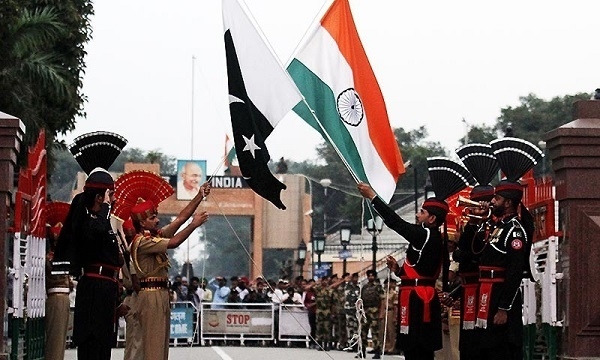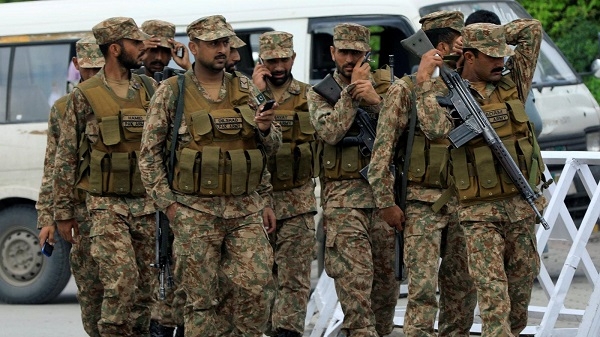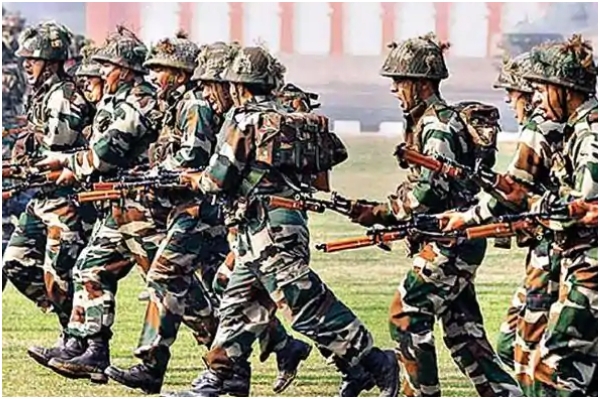Indo Pak Strategic Cauldron
26 Mar 2021 14:36:23
Surprise developments in protracted conflicts are rarely an overnight success. It is no coincidence that China India Disengagement in Ladakh, Announcement of Joe Biden Policies in America, Rise of Domestic problems in India and Pakistan and Kashmir Cease Fire Deal happened at about the same time. In 2019, during the Indian General Elections, Pakistan Prime Minister Imran Khan Niazi had famously said that there was a “better chance of peace talks with India” if Prime Minister Narendra Modi was voted back to power. But relations between both countries deteriorated in 2019 with the abrogation of Article 370 and 35A on 05 August, 2019 and Reorganisation of Jammu and Kashmir into two Union Territories. Political, Commercial, Cultural and Sporting ties were snapped and cross Line of Control Movements were completely stopped. High Commissioners from both countries were recalled. Pakistan upped the ante across the LOC resulting in tremendous increase in Cross Border Firings and Ceasefire Violations. However, from early 2021, Pakistan exhibited signs of being open to measures to be taken to reduce tensions.
Pakistan Chief of Army Staff, General Qamar Javed Bajwa stated at Passing Out Parade of Pakistan Air Force Academy on 02 February, 2021 that “It was time to extend hand of peace in all directions. India and Pakistan should resolve the Kashmir issue in a dignified manner”. On 25 February, 2021; Indian and Pakistani Directors General of Military Operations (DGMOs) “mutually agreed on maintaining peace on the Line of Control by resorting to stop firing heavy ordnance at each other’s posts and villages”. This decision by India and Pakistan to ‘cease firing along the Line of Control and all other sectors’, with effect from the midnight 25 February, 2021, was an important thaw in the bilateral relationship. Neither the statements of both DGMOs nor speech of General Qamar Javed Bajwa was serendipitous. Something must have gone on between two sides behind the scenes for several weeks.

There is speculation that an exchange of views between Indian National Security Advisor, Ajit Doval, and Special Assistant to the Pakistan Prime Minister, Moeed Yusuf had played a part in this development. Indian domestic troubles and Pakistan’s internal dynamics as also, ascendant role of Pakistan Army, must have also been at play. Pakistan Army has an outsized role in Foreign and Security Polices in Pakistan. It is the power behind throne. However, this time around, Pakistan Army may have decided that Prime Minister Imran Khan needs to be given some space to develop the economy for which the perception of a peaceful neighbourhood is important. There is a hope that as a follow up to the DGMO’s hotline talk, the High Commissioners will be reinstated on both sides, which may open up possibilities of a restart of trade and travel. Prime Minister Narendra Modi wishing Covid affected Imran Khan a speedy recovery in third week of March, 21 has added n impetuous to this hope.
Pakistan Army must have felt that ceasefire agreement could raise credibility of Pakistan in Washington with respect to its call for peace in Afghanistan and also help it start on a better footing with Biden when the two sides start talking about US Pakistan cooperation. All this explains General Qamar Javed Bajwa’s remarks on 02 February, 21. Surprisingly, General Bajwa reiterated his aforesaid stand on friendship between two countries, in his validatary speech at a function in Islamabad. Most of us did not believe Thirteen Minute speech of General emphasing “India and Pakistan should bury the past, make a new beginning, they have a shared stake in peace so they can focus on their economies” at Islamabad Security Dialogue on 11 March, 2021.This historical distrust is because that is what every Pakistani leader says every time and then stabs us in the back. Therefore, since past is the only guide to future performance, there is no point talking to/about Pakistan.
Strong words of caution have come from the rugged old Intelligence/ Strategic/Military veterans. In their opinion; what Pakistani General meant when he says bury the past and move on was; India should bury the past and move on while Pakistan subverts us. It is a warning from people who have dedicated their lives in fighting same adversary. But it is worthwhile to remember the fact that in 2021; it is not possible for either India or Pakistan to pulverise each other, especially when both have Strong, Competing Nationalism and Robust, Nuclear Armed Militaries. Therefore; it is time to amend famous Diplomatic jargon ‘Trust, but verify’ to a new ‘Distrust, but verify’, while dealing with Pakistan. That entails; while you view every new move coming from Pakistan with the highest degree of suspicion, you nevertheless check it out. Statements of Javed Bajwa need not be discarded but must be verified.

So, how do we propose to break the deadlock? Bombing them is not the answer as is clear from Kargil, Op Parakram and Pulwama/Balakot. Achieving anything by force; Militarily, Diplomatically, Politically or Economically, is out of the question. It is not possible today to achieve any of our territorial objectives, Pakistan Occupied Kashmir or Aksai Chin, by Military Force. Any such action will face immediate Global Wrath and Force a Ceasefire before we can advance a few miles.
General Bajwa’s written speech spells out a commitment of non interference in the internal affairs of India. Though, his speech finds a mention of Kashmir; he emphasized that progress in relations depends on India creating a ‘conducive environment’ on her side of Kashmir. Both these statements may seem like a platitude. But it is better to be cautious and verify. In any customary mention of Jammu and Kashmir, he would have reminded India, a need to restore pre 05 August 2019 status forthwith, and prepare for self-determination as laid down in the UN Security Council Resolutions. The deviation does not mean that Pakistan Army has given up its insistence on the restoration of the pre 05 August 2019 status quo ante. Hence the need to check it out.
As far Pakistani COAS, he perceives a domineering India to his East, an unraveling Afghanistan and a complex Iran to the West, an overbearing China to the North and an elusive America which is no longer his ally. He is sure that America and India are allies and their relations are becoming stronger in Quad. His Army has either to make peace with India, or continue fighting her and become a Military Protectorate and Economic Colony of China. General Qamar Javed Bajwa, like all other Pakistani elite, is driven by extreme hatred of India, and therefore, has no alternative but to lick Chinese. More so now, because Gulf countries, especially Saudi Arab, are alienated from Pakistan and are recalling their loans. At present, only way ahead to come out of this cauldron is to offer Peace to India. General Bajwa, now seems to have become pragmatic to realise that neither conquest nor reconquest of territory is possible in 21st century. The General must have also have realised the truth that; Pakistan alone or even with help of China, cannot defeat India in the manner of World War II. There is no instance of that happening since that war. Americans, the mightiest of all, failed in Korea, Vietnam, Afghanistan and Iraq. Hence, the reconciliatory tone in the speech by the General.
India is also not looking forward to any conflict. In past seven years, allocation for Defence Expenditure has remained same or marginally declined. Obviously, we are not preparing for war. Similarly, Pathankot, Uri, Pulwama and Galwan has demonstrated that India will not be knee jerked into a conflict. Modi Government, if it wants, can build on a “No War Policy” because it is strong enough to do so. At the same time, one should not forget that Indian Prime Minister has sternly issued a warning against expansionism in his address to NCC Contingent on 28 January, 2021. This was a sage, open counsel for Pakistan since she has spent all seven decades of her existence believing she can take away from India all of Jammu and Kashmir. In that quest, Pakistan lost a larger part of its own original country. In continuing process, she became a military ruled, single agenda state, a chronic basket case with 13 Inter National Monetary Fund Bailouts over 30 years and in crashing need for another one sooner than later.

India is committed not just to defending the borders that exist in reality, but reclaiming the ones shown on our map. In the 70 years since our independence, we haven’t been able to get a square inch more of that territory. This is despite four large wars and several smaller ones. The chunks of territory captured by us in 1965 and 1971 had to be returned, as they might have to be in the future as well. Modi Government has clearly realised this and is trying to establish, stable, viable and peaceful national boundaries, so that India can proceed, unhindered, with the vital tasks of nation building and socio economic development.
Be that as it may, with the ceasefire in effect, it will certainly help India and Pakistan diffuse tensions along the Line of Control. India on it part has affirmed that there would not be any let up in its Counter Terrorism Efforts. It is time perhaps to take additional, incremental steps, towards peace and reconciliation. These could include restarting cross LoC Trade and Connectivity, which could create the right environment for fruitful dialogue to resolve outstanding issues between the two South Asian neighbours. After all, who says, Diplomacy and Military Action do not go Hand in Hand?
.
.